
A new analysis of the phase 3 PROPEL study showed that switching to cipaglucosidase alfa/miglustat therapy enhanced outcomes among patients with late-onset Pompe disease.

A new analysis of the phase 3 PROPEL study showed that switching to cipaglucosidase alfa/miglustat therapy enhanced outcomes among patients with late-onset Pompe disease.

Using data from observational studies, a recent meta-analysis offered a comprehensive overview of the risk profile of cardiovascular comorbidities in patients with myasthenia gravis.

A new study presented at AANEM 2024 revealed that daily dosing of oral edaravone was well tolerated and did not reveal any new safety concerns in patients with amyotrophic lateral sclerosis.

Long-term use of ravulizumab in patients with generalized myasthenia gravis led to a significant reduction in corticosteroid dependence, highlighting its potential steroid-sparing benefits.
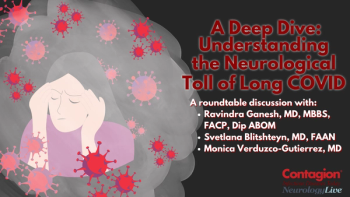
In our latest roundtable series, experts discussed Long COVID prevalence, underreporting, accurate diagnosis, and emphasized that Long COVID serves as an umbrella term.

Jonas Hannestad, MD, PhD, chief medical officer at Gain Therapeutics, provided clinical perspective on promising data from a phase 1 first-in-human study of GT-02287, an investigational therapy for Parkinson disease with or without a GBA1 mutation.

Over an 18-month period, patients showed strengthened scores on Rasch-built Overall Disability Scale, a patient-reported outcome measure of activity and social participation.
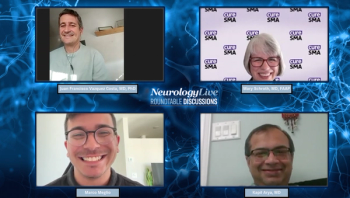

Here's some of what is coming soon to NeurologyLive® this week.

In this segment, the panel discussed adult-onset 5q spinal muscular atrophy (SMA), highlighting its frequent underdiagnosis and subtle symptoms such as cramps, fasciculations, and sports intolerance.

Test your neurology knowledge with NeurologyLive®'s weekly quiz series, featuring questions on a variety of clinical and historical neurology topics. This week's topic is on Alzheimer disease.

The discussion highlighted the need for national or local protocols, insurance approvals, and close collaboration with families to optimize patient outcomes.
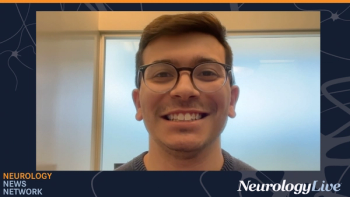
Neurology News Network. for the week ending October 12, 2024. [WATCH TIME: 4 minutes]

Take 5 minutes to catch up on NeurologyLive®'s highlights from the week ending October 11, 2024.

The director of the Helen and Robert Appel Alzheimer’s Disease Research Institute at Weill Cornell Medicine talked about findings from a recently published study on immune responses to Alzheimer disease risk genes between male and female mice. [WATCH TIME: 4 minutes]

Sarah Anderson, PharmD, NBC-HWC, senior director of clinical resources and programming at National MS Society, talked about the significant updates under the Inflation Reduction Act to come in 2025 for patients with multiple sclerosis.

In this discussion, experts provide key considerations in the process of newborn screening for SMA, noting the need for developing local protocols and understanding the limitations of screening infants early in life.

HNSA-5487 exhibited lower pre-treatment anti-drug antibody levels and reduced ADA responses compared to imlifidase, indicating a favorable immunogenicity profile and strong potential for redosing, with no serious adverse events observed.


AOC 1001, also known as del-desiran, has shown promising results in improving muscle strength and reducing myotonia in patients with DM1, with patients even reporting better daily activities like hand grip strength.
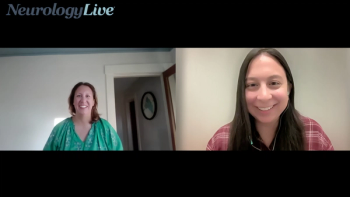
The senior director of clinical resources and programming at National MS Society discussed the significant updates to Medicare Part D in 2025 that will cap annual out-of-pocket costs and introduce a flexible payment plan option for enrollees. [WATCH TIME: 9 minutes]

Catch up on any of the neurology news headlines you may have missed over the course of September 2024, compiled all into one place by the NeurologyLive® team.

In this episode, experts discuss groundbreaking updates in spinal muscular atrophy diagnosis, emphasizing the importance of early intervention and newborn screening.

After 52 weeks of treatment, no significant differences were found in cardiac MRI measures such as ejection fraction, end diastolic volume, or circumferential strain between the two groups.

The decision follows positive data from multiple trials, showing significant improvement in both cardiac function and muscle performance in patients with DMD.

Alexander disease, a rare leukodystrophy estimated to occur in 1 in 1 million patients in the United States, has no FDA-approved treatments to date.
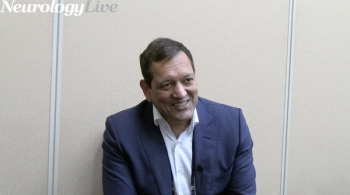
The chief medical officer and chief development officer at BlueRock Therapeutics discussed the promise behind bemdaneprocel and its unique mechanism of action relative to other Parkinson disease treatments. [WATCH TIME: 3 minutes]

Erik Musiek, MD, PhD, a professor of neurology at Washington University in St. Louis, provided clinical insight on a presentation from ANA 2024 highlighting the intricate relationship between circadian rhythms, glial activation, and neuroinflammation in Alzheimer disease.

In this episode, our panel of experts delves into the latest updates on spinal muscular atrophy diagnosis, focusing on the critical role of newborn screening, early intervention, and evolving classification methods for improved patient outcomes.

The postdoctoral research assistant at Charité University Berlin discussed how the new diagnostic criteria for multiple sclerosis could offer earlier detection, especially in those with overlapping autoimmune conditions, through advanced imaging markers.